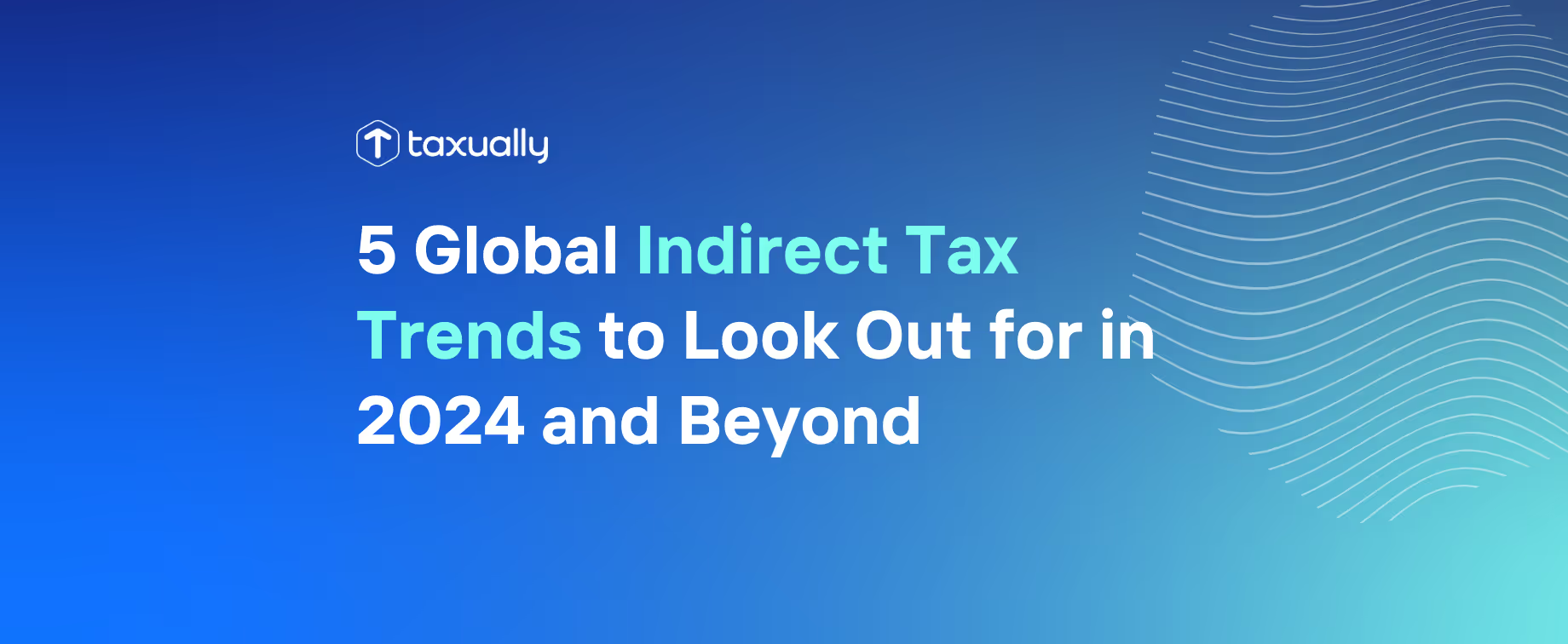Key takeaways
- Digital transformation is reshaping tax compliance: Governments are adopting e-invoicing, real-time reporting, and digital audit tools, requiring businesses to modernize systems.
- Global tax expansion and regulation tightening: VAT, GST, and e-commerce tax obligations are growing worldwide, especially for digital and cross-border services.
- Sustainability and complexity on the rise: Environmental taxes and diverse digital service tax rules are adding new layers of compliance and cost for global businesses.
Understanding the complexities of indirect taxes is a vital aspect for businesses operating on a global scale. As we continue through 2024 and beyond, several key trends are emerging that could impact how companies manage their tax strategies. Here are five global indirect tax trends businesses should be aware of.
1. Digitalization of tax systems
The digital transformation of tax systems is becoming increasingly prevalent as governments seek more efficient ways to manage tax collection and enforce compliance. This shift includes mandatory electronic invoicing, real-time data transmission to tax authorities, and advanced analytics to scrutinize tax submissions. The EU’s VAT in the Digital Age (ViDA) is one such initiative. Businesses must adapt to these new digital demands, which may require significant updates to their existing financial and accounting systems to ensure seamless integration and compliance.
2. Expansion of Goods and Services Tax (GST) and Value-Added Tax (VAT)
GST and VAT systems are expanding in scope and geography as governments look to stabilize revenue sources that are less volatile than income taxes. This expansion often includes broadening the tax base to cover new goods and services, especially in the digital domain. For instance, several jurisdictions have introduced or are planning to introduce VAT on digital services provided by non-resident companies, a move that reflects the global trend towards capturing revenue from the digital economy. Businesses, especially those operating internationally, must stay abreast of these changes and prepare for added tax obligations.
3. Increased focus on e-commerce
The booming e-commerce sector has captured the attention of tax authorities worldwide. New regulations are frequently introduced that require e-commerce platforms and even individual sellers to register for VAT, GST, or sales tax, collect it from customers, and remit it directly to the relevant tax authorities. This regulatory push aims to level the playing field between online and brick-and-mortar businesses and to close previous tax loopholes. Companies involved in e-commerce need to be particularly vigilant about these regulations to avoid non-compliance, which can result in hefty fines and reputational damage.
4. Rise of environmental taxes
Environmental concerns are translating into tax policy, with new or increased taxes on activities that pollute the environment. Green taxes such as EPR (Extended Producer Responsibility) and single-use plastics taxes are becoming more common as governments attempt to use fiscal policy to influence business behavior and fund sustainability initiatives. For instance, Germany, France, and Spain have already implemented mandatory EPR regulations, which require businesses to register and contribute financially to collection and recycling programs. Companies can reduce these costs by investing in greener practices or developing more sustainable products to mitigate the financial impact of these environmental taxes.
5. Complexity in digital services tax rules
The digital services tax is increasingly complex and varied across different jurisdictions. This includes services such as streaming, online gaming, and cloud computing. Each country may have different rules regarding what constitutes a taxable digital service and how the tax is calculated and collected. The EU, for example, has specific VAT rules for electronic services provided to consumers, which require businesses to charge VAT, in most cases, based on the customer’s location. Companies offering digital services need to understand these diverse regulations to ensure compliance and avoid penalties, which might involve investing in systems capable of handling multiple tax regimes simultaneously.
Conclusion
The landscape of indirect taxes is evolving rapidly, driven by technological advancements, economic shifts, and increasing environmental consciousness. For businesses, the ability to adapt to these changes will be crucial. Investing in technology and expertise to manage these complex tax environments effectively will not only ensure compliance but also provide a competitive advantage in the dynamic global market.
Do you need help with your VAT or sales tax compliance? Book a free call with one of our experts to find bespoke solutions for your business, optimize your tax costs, and reach millions of new potential customers.
Frequently asked questions
New Year's Day - 1/1/2024Memorial Day - 5/27/20244th of July - 7/4/2024Labor Day - 9/2/2024Thanksgiving Day - 11/28/2024Day after Thanksgiving - 11/29/2024Christmas Eve - 12/24/2024Christmas Day - 12/25/2024
What are indirect taxes?
Indirect taxes are taxes on goods and services—such as VAT, GST, or sales tax—collected by businesses on behalf of the government rather than directly from income or profits.
Why are governments digitalizing tax systems?
Digitalization improves tax collection efficiency, reduces fraud, and enables real-time monitoring through tools like e-invoicing and data reporting systems.
How do environmental taxes affect businesses?
Green taxes, such as EPR or plastics levies, require companies to contribute to recycling and sustainability programs, encouraging more eco-friendly business practices.
What challenges do digital service providers face?
Different countries have varying rules for taxing digital services like streaming or cloud computing, making compliance complex for global businesses.



















